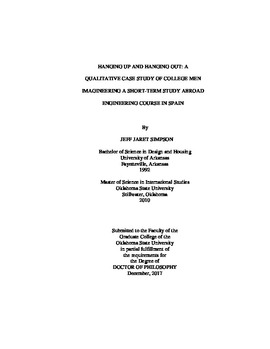| dc.contributor.advisor | Wanger, Stephen P. | |
| dc.contributor.author | Simpson, Jeff Jaret | |
| dc.date.accessioned | 2018-06-18T16:02:26Z | |
| dc.date.available | 2018-06-18T16:02:26Z | |
| dc.date.issued | 2017-12 | |
| dc.identifier.uri | https://hdl.handle.net/11244/300074 | |
| dc.description.abstract | This naturalistic inquiry case study examined the experiences of five college men participating in a two-week, summer study abroad course administered by a Midwestern, public land-grant university. The short-term program model is popular with students and universities in the United States as an affordable and convenient way to increase the number of students participating in education abroad. However, there is limited research examining the phenomenon, especially qualitative research on men's participation. My study is the only known naturalistic inquiry qualitative case study to include participant observation in situ focused specifically on U.S. college men's short-term program experiences. I use the term imagineer to convey the process of imagining a future participation in study abroad then carrying those imaginings into the construction of the experience. | |
| dc.description.abstract | My study design used participant observations, including travel with the men abroad, and interviews before, during and after the trip as well as photographs, drawings and participant interactions with those artifacts. My experience as director of a study abroad office and my travel background as a participant on multiple study abroad programs augmented my findings. The participants in my study were traditional-aged, emerging adults actively constructing identities and focused on self, happiness, instant gratification and consumption (Arnett, 2000; Nelson, 2003). They relied on multiple imaginaries (Harkonen & Dervin, 2015, 2016) to imagineer their study abroad experiences. Doing gender (West & Zimmerman, 1987) emerged as salient as the men constructed gender roles and sought social capital (Bourdieu & Passeron, 1977) through masculine performances abroad. As participants in a course compressed into two weeks, the men experienced time as limited and responded accordingly by intensifying the pace of their actions and engaging in riskier behaviors, like the consumption of alcohol, designed to meet lightly crafted expectations for having fun and making friends. | |
| dc.description.abstract | Through ongoing analysis, I arrived at four primary themes with multiple subthemes related to my research questions. As a part of my analysis, I explored the men's interpersonal relationships, their responses to perceptions of time, their anticipation of fun adventure and their gendered behaviors and vulnerability as they imagineered their experiences in the study abroad space. My findings enhance the depth of understanding of the short-term study abroad phenomenon, contribute new perspectives on men's participation and inform implications for research and practice in the field of education abroad. | |
| dc.format | application/pdf | |
| dc.language | en_US | |
| dc.rights | Copyright is held by the author who has granted the Oklahoma State University Library the non-exclusive right to share this material in its institutional repository. Contact Digital Library Services at lib-dls@okstate.edu or 405-744-9161 for the permission policy on the use, reproduction or distribution of this material. | |
| dc.title | Hanging up and hanging out: A qualitative case study of college men imagineering a short-term study abroad engineering course in Spain | |
| dc.contributor.committeeMember | Bailey, Lucy E. | |
| dc.contributor.committeeMember | Kearney, Kerri S. | |
| dc.contributor.committeeMember | Weiser, Mark | |
| osu.filename | Simpson_okstate_0664D_15520.pdf | |
| osu.accesstype | Open Access | |
| dc.type.genre | Dissertation | |
| dc.type.material | Text | |
| thesis.degree.discipline | Higher Education | |
| thesis.degree.grantor | Oklahoma State University | |
